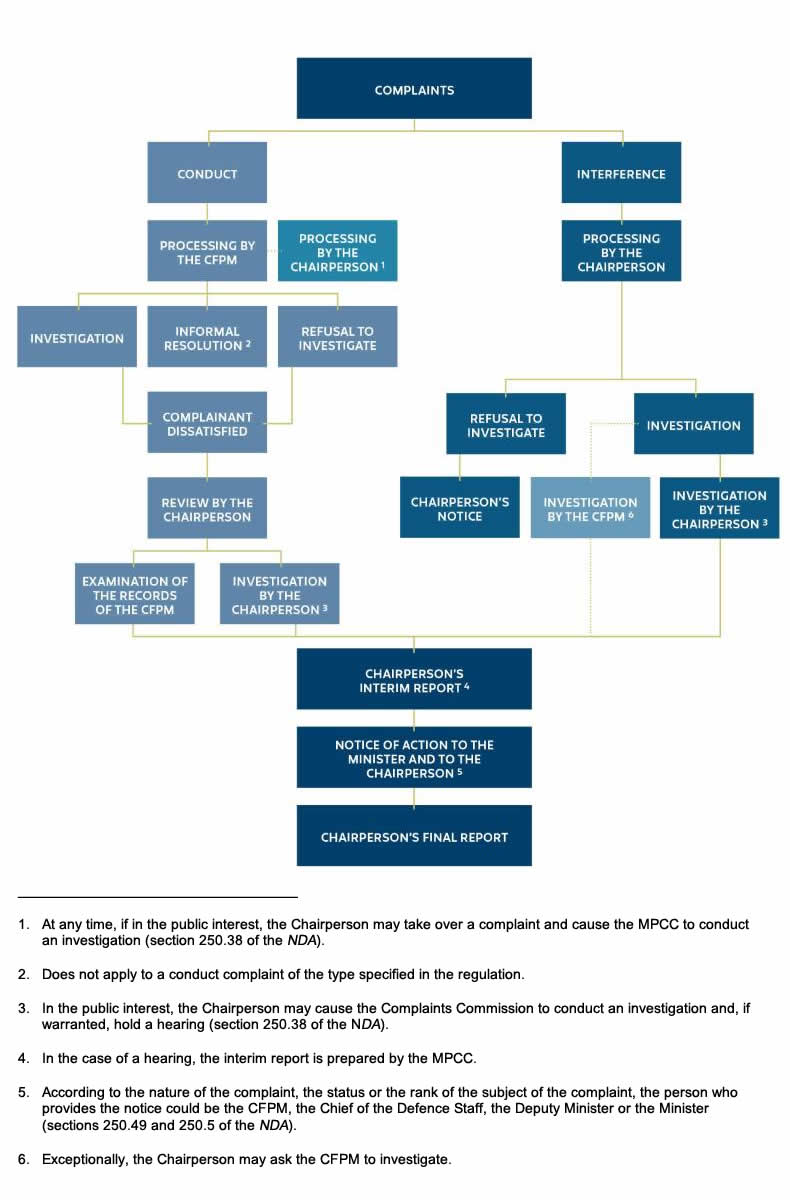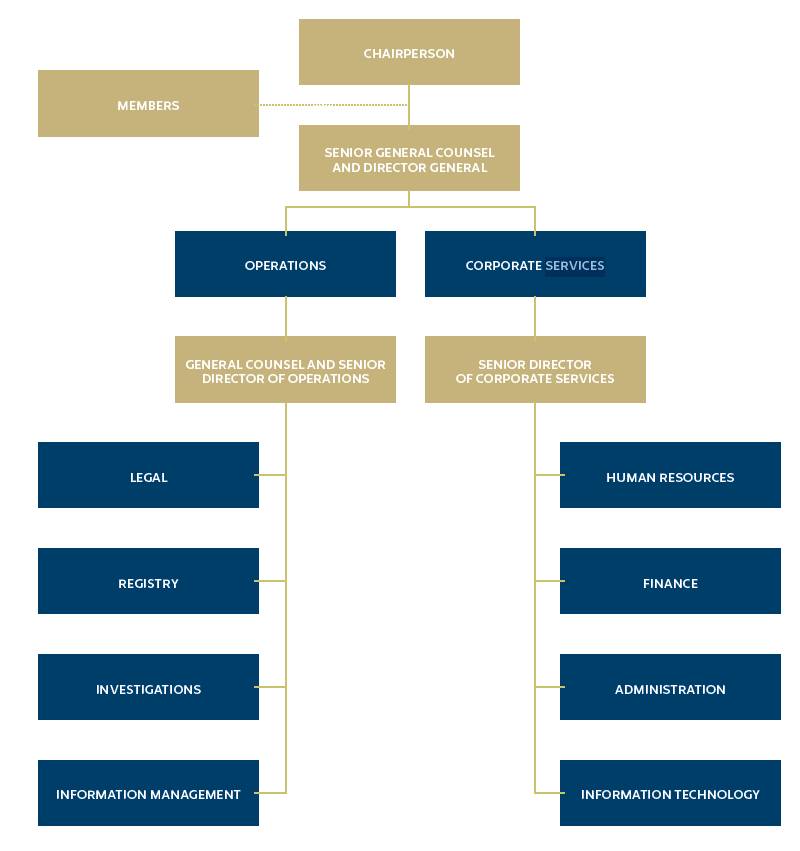2019 Annual Report | Two Decades of Oversight – Effecting Cultural Change in Policing
NOTE: Please be advised that although the fax number remains in previously published documents, our fax line is no longer in service.
© Her Majesty the Queen in Right of Canada, represented by the Military Police Complaints Commission of Canada, 2020.
Catalogue No. DP1 | ISSN 1700‑6627
Table of Contents
- Letter of Transmission to the Minister
- Chairperson's Message
- Part 1 – Overview
- Military Police Complaints Commission of Canada
- Mandate and Mission
- Organizational Background
- The Canadian Forces Provost Marshal and the Deputy Commander, Canadian Forces Military Police Group/Professional Standards
- The Military Police
- Conduct Complaints Process
- Interference Complaints Process
- Public Interest Investigations and Hearings
- Two decades of oversight
- Part 2 – The Year in Review
- Monitoring and Investigations
- Public Interest Investigation into Anonymous Complaint (Treatment of Detainees)
- Public Interest Investigation into a Historical Complaint Alleging Torture and Abuse of Former Canadian Armed Forces Members during their Training
- Impact on Military Policing – Case Summaries
- Outreach
- Collaboration
- Part 3 – Stewardship Excellence
- Part 4 – Chairperson's Conclusion
- Our Organization
Letter of Transmission to the Minister
March 27, 2020
The Honourable Harjit Sajjan, P.C., M.P.
Minister of National Defence
National Defence Headquarters
Major-General George R. Pearkes Building
Ottawa, Ontario K1A 0K2
Dear Minister:
In accordance with subsection 250.17(1) of the National Defence Act, it is my duty and privilege to submit, for tabling in Parliament, the Military Police Complaints Commission of Canada's 2019 Annual Report.
In this annual report, you will find a detailed discussion of all significant aspects of the Military Police Complaints Commission of Canada’s activities during 2019, including summaries of some of its reviews and investigations of complaints.
All of which is respectfully submitted.
Yours truly,
Original signed by
Hilary C. McCormack, LL.B.
Fellow Litigation Counsel of America
Chairperson
Chairperson’s Message
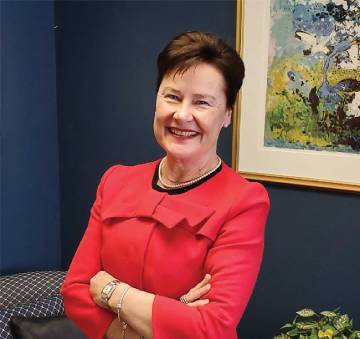
It is with great pride that I present the 20th anniversary edition of the Military Police Complaints Commission of Canada (MPCC)'s Annual Report. The theme this year – EFFECTING CULTURAL CHANGE IN POLICING – builds on the evolution of civilian oversight, provides a retrospective of our two decades of operation and highlights our accomplishments during 2019.
The MPCC was created in December 1999 as an independent oversight body through amendments to the National Defence Act. These amendments incorporated recommendations emanating from comprehensive reviews undertaken by the Commission of Inquiry into the Deployment of Canadian Forces to Somalia (better known as the Somalia Inquiry) and the Report of the Military Police Services Review Group (known as the Dickson Report), which were released in 1997. Both reports advocated for greater accountability in our military justice system.
The MPCC has rigorously worked to embody the principles raised through these critical reviews and to incorporate the recommendations into its mandate to investigate and report on any complaints about Military Police actions and to protect military police independence through the investigation of interference complaints raised by military police members. The latter concept is unique among military circles worldwide.
Over the past two decades, the MPCC has grown under the stewardship of four Chairpersons. The first Chairperson, Louise Cobetto, had the unique challenge of establishing the MPCC’s by laying the foundation for the complaints process and establishing relations with the key stakeholders in the Canadian Armed Forces (CAF). She was succeeded by the late Peter Tinsley who presided over the MPCC’s first public interest hearings and successfully opposed legislative changes that would have restricted the MPCC’s mandate. Glenn Stannard was the MPCC's third Chairperson and presided over the two most significant public interest hearings in the history of the MPCC; namely, the Afghanistan and the Fynes Public Interest Hearings. I have been at the helm since October of 2015 and have instituted a timeliness review to ensure more accountability and fairness to all parties in the complaints process. I am indebted to my predecessors for their diligence in assembling the pieces over the years to create the strong organization we have today.
On December 3, 2019 we marked the MPCC’s 20th anniversary with a symposium to assess our accomplishments over the last two decades, how we have matured as an organization, what further improvements could be made, and how we can identify and meet future challenges. One key challenge facing both military and civilian police services is how to determine where to set the bar for expectations about police response. This and other important questions will be the subject of study and discussions as we enter our third decade. Overall, the symposium was a great success and it provided an opportunity for MPCC and CAF leaders, past and present, to exchange ideas in a collegial setting.
As the MPCC has continued to grow, its operating environment has become increasingly complex and challenging. Within such an environment, policing and accountability have evolved and such evolution has created a need for cultural adaptation.
One such significant transformation for the Military Police occurred on April 1, 2011, when the Canadian Forces placed all MP units under a new command formation, the Canadian Forces Military Police Group (CF MP Gp). All military police units are now under the command of the Canadian Forces Provost Marshal (CFPM) rather than the military chain of command.
The Military Police as an institution has worked hard to achieve gender equity within their ranks. When the MPCC began operating in 1999, women represented 11 percent of total Military Police members and 12 percent of Military Police Officers. At the end of 2018, those percentages increased to 13 percent for members and 24 percent for officers. The latter number is indicative of a strong trend toward gender equity in the leadership corps.
Over the past year, the MPCC continued to demonstrate value-added in its work. Of note, I took a proactive stance in asking the CFPM to reopen a criminal investigation that ultimately led to very serious criminal charges being laid in the civilian system. This action indicates our ability to be proactive where warranted, which augments our traditional role of responding to complaint allegations.
Two Public Interest Investigations (PII) progressed through 2019. We are currently drafting the Interim Report for our 14th PII involving an anonymous complaint about the treatment of Afghan detainees. On April 11, 2018 I called for the MPCC's 15th PII to look into an historical complaint alleging torture and abuse of former CAF members during their training. More detailed updates on these PII can be found in the report.
As part of an ongoing commitment to foster expertise and excellence in civilian oversight, I presented at the annual conference of the Canadian Association for Civilian Oversight of Law Enforcement (CACOLE). My presentation dealt with police use of force and strip searches. Our participation in domestic and international fora is an important element of the MPCC's outreach to the law enforcement community.
Our outreach within the Canadian Armed Forces and Military Police communities continues to be an important element of our mandate. On September 23, 2019, I was hosted by the Commandant of the Military Police Academy, Lieutenant-Colonel Adam Battista. It was a very productive and informative day during which I received an in-depth briefing on their curriculum and observed practical training scenarios. Our outreach visits provide an opportunity to explain the importance and benefits of civilian oversight. We always welcome the questions and opinions of military police personnel and are keen to learn about their challenges.
We benefit from collaborative working relationships with the Military Police and the CFPM as well as the Department of National Defence. We are grateful to Brigadier-General Simon Trudeau and his Deputy Commander, Colonel Martin Laflamme, for their ongoing support and cooperation. We continued our annual meetings to discuss issues of mutual interest. The MPCC also appreciates the cooperation of all Military Police officials and military legal officers of the Office of the Judge Advocate General (JAG) Commodore Geneviève Bernatchez.
It goes without saying that the foundation of our work and our steady progression is the dedicated and highly professional MPCC staff. As always, I am grateful for each of them, both as individuals and collectively.
One of our Commission Members retired from the MPCC this year. My sincere thanks to Troy DeSouza for work well done during his tenure. As well, my appreciation goes out to Commission Members Michel Séguin, Bonita Thornton and Ron Kuban for their unwavering support and their ongoing commitment to professionalism.
We have demonstrated continued ongoing growth in delivering our mandate over two decades. I believe we are well poised to deal with challenges of the coming year and the decades ahead.
Original signed by
Hilary C. McCormack, LL.B.
Fellow Litigation Counsel of America
Chairperson
Part 1 – Overview
I – Military Police Complaints Commission of Canada
The Military Police Complaints Commission of Canada (MPCC) was established on December 1, 1999 by the Government of Canada to provide independent civilian oversight of the Canadian Forces Military Police. This was achieved through an amendment to the National Defence Act (NDA) creating a new Part IV, which sets out the mandate of the MPCC and how complaints are to be handled. As stated in Issue Paper No. 8, which accompanied the Bill that created the MPCC, its role is “…to provide for greater public accountability by the military police and the chain of command in relation to military police investigations.”
II – Mandate and Mission
Mandate: The MPCC reviews and investigates complaints concerning Military Police conduct and investigates allegations of interference in Military Police investigations. The MPCC reports its findings and makes recommendations directly to the Military Police and National Defence leadership.
Mission: To promote and ensure the highest standards of conduct of Military Police in the performance of policing duties and to discourage interference in any Military Police investigation.
The MPCC fulfils its mandate and mission by exercising the following responsibilities:
- Monitoring investigations conducted by the Canadian Forces Provost Marshal (CFPM) of Military Police conduct complaints;
- Reviewing the disposition of conduct complaints about Military Police members at the request of the complainant;
- Investigating complaints of interference made by Military Police members; and
- Conducting public interest investigations and hearings.
III – Organizational Background
The MPCC is one of 8 organizations in the Defence Portfolio. While it reports to Parliament through the Minister of National Defence (MND), the MPCC is both administratively and legally independent from the Department of National Defence (DND) and the Canadian Armed Forces (CAF). The MPCC is not subject to direction from the MND in respect of its operational mandate.
The MPCC is an independent federal government institution as defined under Schedule I.1 of the Financial Administration Act (FAA). As an independent oversight agency, the MPCC must operate at a distance and with a degree of autonomy from government, including the DND and the CAF. The MPCC Commission Members and employees are civilians and are independent of the DND and the CAF in fulfilling their responsibilities and accountabilities in accordance with governing legislation, regulations and policies.
Tribunal decisions and MPCC operations and administration must also be, and be seen to be, free from ministerial influence, other than seeking the signature of the MND as the Minister responsible for routine tabling of the MPCC’s Departmental Results Reports, Departmental Reports, Annual Reports to Parliament, and other accountability documents such as Memoranda to Cabinet and Treasury Board submissions.
The Chairperson, as Chief Executive Officer (CEO) of the MPCC, is accountable for all MPCC activities and for the achievement of results. Based on the Terms and Conditions of Employment for Full-Time Governor in Council Appointees, the Chairperson is CEO, statutory deputy head or Deputy Head, as defined by the FAA and as designated through the Governor in Council.
As Deputy Head, the Chairperson is accountable to Parliament for fulfilling management responsibilities, including financial management. This includes accountability for allocating resources to deliver MPCC programs and services in compliance with governing legislation, regulations and policies; exercising authority for human resources as delegated by the Public Service Commission; maintaining effective systems of internal controls; signing accounts in a manner that accurately reflects the financial position of the MPCC and exercising any and all other duties prescribed by legislation, regulations or policies relating to the administration of the MPCC.
IV – The Canadian Forces Provost Marshal and the Deputy Commander, Canadian Forces Military Police Group/Professional Standards
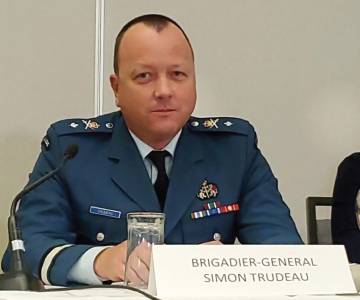
On April 1, 2011, the CFPM assumed full command of all Military Police members who are directly involved in policing. The CFPM also assigns Military Police resources to other supported commanders under operational command.
The Deputy Commander of the Canadian Forces Military Police Group (CF MP Gp) manages public complaints and internal military police misconduct investigations and ensures adherence to the Military Police Professional Code of Conduct.
The CFPM is the first to respond to complaints about Military Police conduct. The MPCC has the authority to monitor the actions taken by the CFPM as it responds to complaints, and to conduct its own reviews and investigations as required. The MPCC has the exclusive authority to deal with interference complaints.
The MPCC’s recommendations, contained in its Interim and Final Reports, are not binding on the CAF and the DND. However, such recommendations do provide the Military Police with the opportunity to improve its operations and further enhance transparency and accountability.
Detailed information about the conduct and interference complaints processes are set out in sub-sections vi) and vii).
V – The Military Police
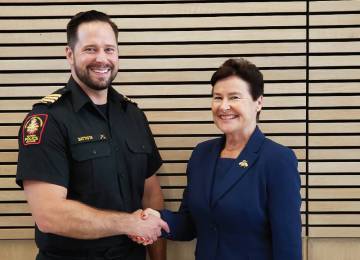
The CAF Military Police Branch was formed in 1968 with the unification of the CAF. Military Police members were allocated to the Army, Navy and Air Force. The stated Mission of the CAF Military Police is to contribute to the effectiveness and readiness of the CAF and the DND through the provision of professional police, security and operational support services worldwide.
The Military Police Branch is comprised of 2,019 personnel: 439 reservists and 1,580 regular force who are sworn, credentialed members (officers and noncommissioned members). Credentialed members are those members who are entitled to be in possession of a Military Police member badge and identification card and thus are peace officers by virtue of article 22.02 of the Queen’s Regulations and Orders, section 156 of the NDA and section 2 of the Criminal Code.
The Military Police exercise jurisdiction within the CAF over both DND employees and civilians on DND property. The Military Police form an integral part of the military justice system in much the same way as civilian police act within the civilian criminal justice system. Military Police routinely train and work with their civilian counterparts in the provision of police and security services to the CAF and the DND.
Members of the Military Police are granted certain powers under the NDA in order to fulfill their policing duties. For example, Military Police members have the power to arrest, detain and search. The Criminal Code recognizes members of the Military Police as peace officers. Therefore, they can make arrests and lay charges in civilian criminal courts. Additionally, Military Police members posted to the Canadian Forces National Investigation Service (CFNIS) can also lay charges under the NDA's Code of Service Discipline..
VI – Conduct Complaints Process
Conduct Complaint Filed
Anyone may make a conduct complaint regarding the Military Police in the performance of their policing duties or functions, including individuals not directly affected by the subject matter of the complaint. Such complaints are initially dealt with by the CFPM. Informal resolution is encouraged.
Complaint Investigated by the CFPM
As the CFPM investigates a complaint, the MPCC monitors the process. At the conclusion of the investigation, the CFPM provides a copy of its final disposition of the complaint to the MPCC. The MPCC may, at any time during the CFPM investigation, assume responsibility for the investigation or call a public hearing if it is deemed to be in the public interest (see section viii).
Request for Review
Complainants may request the MPCC review the complaint if they are not satisfied with the results of the CFPM’s investigation or disposition of the complaint.
MPCC Reviews Complaint
This involves an examination of documentation compiled by the CFPM’s office during its investigation, as well as consideration of applicable legislation, and relevant military and civilian police policies and procedures. Depending on the case, the MPCC’s review may involve interviews with witnesses, including the complainant and the subject of the complaint.
MPCC Releases Interim Report
At the completion of the review, the Chairperson sends the Interim Report to the MND, the Chief of the Defence Staff (CDS) and the CFPM, setting out the MPCC's findings and recommendations regarding the complaint.
Notice of Action
The Notice of Action is the official response by the CAF to the Interim Report. It outlines what action, if any, has been or will be taken in response to the MPCC’s recommendations.
MPCC Releases Final Report
After considering the Notice of Action, the MPCC issues a Final Report of findings and recommendations. The Final Report is provided to the MND, the Deputy Minister (DM), the CDS, the Judge Advocate General (JAG), the CFPM, the complainant(s) and the subject(s) of the complaint, as well as anyone who has satisfied the MPCC that they have a substantial and direct interest in the case.
How the MPCC Carries Out Its Reviews and Investigations of Conduct Complaints
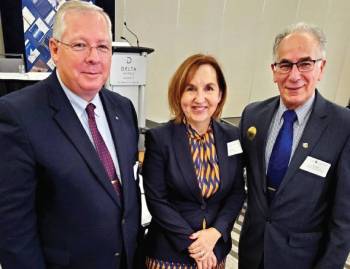
In response to a request from a complainant for a review, the MPCC follows the steps described below:
- The MPCC conducts a preliminary review of the complaint and the related Military Police (MP) files and records, which the Canadian Forces Provost Marshal (CFPM) is obligated to provide, in order to determine how to respond to the request for review; including, whether an investigation is required, the scope of the investigation warranted and how to approach the investigation. The Chairperson may also delegate a Commission Member to handle the file.
- A lead investigator is assigned and, with MPCC legal counsel, reviews the evidence and other materials gathered during the CFPM's investigation of the complaint. This could be hundreds of pages of documents, emails, handwritten notes and reports, and many hours of witness audio and video recordings.
- The lead investigator, in consultation with the assigned legal counsel, prepares an Investigative Assessment (IA) for consideration and approval by the Chairperson or delegated Commission Member. The IA is a report summarizing all the available evidence, and identifying any further lines of inquiry which may be necessary in order to conclude the review of the complaint: further documents or records to be obtained; research on issues of law, MP policy or policing best practices; or witness interviews. Where further investigation is deemed appropriate, the IA will also include timeline and budget estimates which must also be approved.
- If the IA, as approved by the Chairperson or delegated Commission Member, indicates that there is sufficient information to decide the complaint, either with or without further records and/or research, the Chairperson or delegated Commission Member will proceed to prepare the Interim Report, containing the MPCC's findings and recommendations regarding the complaint.
- If the Chairperson or delegated Commission Member determines that witness interviews are required in order to decide the complaint, the assigned investigator(s) will proceed to conduct the interviews. The additional information obtained from these interviews will be summarized and added to the IA to produce an Investigation Assessment Report (IAR). Once the IAR is completed to the satisfaction of the Chairperson or delegated Commission Member, the MPCC will then proceed to the preparation of the Interim Report.
- As described in the previous section, the Interim Report is provided to the MND, the CDS and the CFPM for an official response in the form of a Notice of Action. The Notice of Action will be considered in the MPCC’s Final Report, which will be sent to the parties to the complaint, the relevant departmental officials, as well as anyone who has satisfied the MPCC that they have a substantial and direct interest in the case.
VII – Interference Complaints Process
Interference Complaint Filed
Any member of the Military Police who conducts or supervises investigations and believes a member of the CAF or a senior official of the DND has interfered with or attempted to influence a Military Police member investigation may file a complaint with the MPCC.
MPCC Investigates
The MPCC has sole jurisdiction to investigate interference complaints. A preliminary review is conducted to determine whether an investigation should be commenced, the scope of the investigation and how to approach the investigation. Once this process is complete, the MPCC begins its investigation.
MPCC Releases Interim Report
The Interim Report includes a summary of the MPCC’s investigation, as well as its findings and recommendations. This report is provided to the MND, the CDS, if the alleged interference was carried out by a member of the military, or to the Deputy Minister (DM) of National Defence, if the subject of the complaint is a senior official of the DND; and to the JAG and the CFPM.
Notice of Action
The Notice of Action is the official response to the Interim Report. It indicates the actions, if any, which have been or will be taken to implement the MPCC’s recommendations.
MPCC Releases Final Report
Taking into account the response set out in the Notice of Action, the MPCC prepares a Final Report of its findings and recommendations in the case. The Final Report is provided to the MND, the DM, the CDS, the JAG, the CFPM, the complainant(s), and the subject(s) of the complaint, as well as anyone who has satisfied the MPCC that they have a substantial and direct interest in the case.
VIII – Public Interest Investigations and Hearings
At any time, if it is in the public interest, the Chairperson may initiate an investigation into a complaint about police conduct or interference in a police investigation. If warranted, the Chairperson may decide to hold a public interest hearing. In exercising this statutory discretion, the Chairperson considers a number of factors including, among others:
- Does the complaint involve allegations of serious misconduct?
- Do the issues have the potential to affect confidence in the Military Police or the complaints process?
- Does the complaint involve or raise questions about the integrity of senior military or DND officials, including senior Military Police members?
- Are the issues involved likely to have a significant impact on Military Police practices and procedures?
- Are the issues of broader public concern or importance?
Alternate format
The image illustrates the Military Policy Complaints Commission of Canada's (MPCC) complaints process which explains the two processes, namely the conduct complaint and the interference complaint.
- Conduct Complaint
- Processing by the CFPM
- Investigation
- Complainant Dissatisfied
- Informal Resolution (does not apply to a conduct complaint of the type specified in the regulation)
- Refusal to Investigate
- Complainant Dissatisfied
- Investigation
- Processing by the Chairperson (at any time, if in the public interest, the Chairperson may take over a complaint and cause the MPCC to conduct an investigation (section 250.38 of the NDA))
- Complainant Dissatisfied
- Review by Chairperson
- Examination of the records of the CFPM
- Investigation by the Chairperson (in the public interest, the Chairperson may cause the Complaints Commission to conduct an investigation and, if warranted, hold a hearing (section 250.38 of the NDA))
- Review by Chairperson
- Chairperson's Interim Report (in the case of a hearing, the interim report is prepared by the MPCC)
- Notice of Action to the Minister and to the Chairperson (according to the nature of the complaint, the status or the rank of the subject of the complaint, the person who provides the notice could be the CFPM, the Chief of the Defence Staff, the Deputy Minister or the Minister (sections 250.49 and 250.5 of the NDA))
- Chairperson's Final Report
- Processing by the CFPM
- Interference Complaint
- Processing by the Chairperson (at any time, if in the public interest, the Chairperson may take over a complaint and cause the MPCC to conduct an investigation (section 250.38 of the NDA))
- Refusal to investigate
- Chairperson's Notice
- Investigation
- Investigation by the CFPM (exceptionally, the Chairperson may ask the CFPM to investigate)
- Investigation by the Chairperson (in the public interest, the Chairperson may cause the Complaints Commission to conduct an investigation and, if warranted, hold a hearing (section 250.38 of the NDA))
- Refusal to investigate
- Chairperson's Interim Report (in the case of a hearing, the interim report is prepared by the MPCC)
- Notice of Action to the Minister and to the Chairperson (according to the nature of the complaint, the status or the rank of the subject of the complaint, the person who provides the notice could be the CFPM, the Chief of the Defence Staff, the Deputy Minister or the Minister (sections 250.49 and 250.5 of the NDA))
- Chairperson's Final Report
- Processing by the Chairperson (at any time, if in the public interest, the Chairperson may take over a complaint and cause the MPCC to conduct an investigation (section 250.38 of the NDA))
Two decades of oversight
Key highlights of the past two decades
December 1, 2019 marked the 20th anniversary of the day the MPCC officially opened for business. The MPCC was created as an independent, civilian, police oversight body for the Canadian Forces Military Police as a result of amendments to the NDA1. This responded to recommendations in the Report of the Special Advisory Group on Military Justice and Military Police Investigation Services (Dickson Report, March 1997) and the Report of the Commission of Inquiry into the Deployment of Canadian Forces to Somalia (Somalia Inquiry, July 1997). These studies responded to occurrences of serious indiscipline and misconduct, including the torture and murder of a civilian youth in Canadian custody during a 1992-93 peace-enforcement deployment to Somalia. The events of the last two decades laid the foundation for the complaints process and were instrumental in building and shaping the strong organization we have today. The following is a summary of the highlights of the past two decades.
December 1999 First Chairperson, Louise Cobetto, opens MPCC for business
As the first Chairperson, Louise Cobetto had the unique challenge of establishing the MPCC by laying the foundation for the complaints process and establishing relations with the key stakeholders of the CAF . Other reforms during this time frame included: the Military Police Professional Code of Conduct, and the establishment of the Canadian Forces National Investigation Service (CFNIS) as a permanent unit with authority to lay charges under the NDA, commanded by the CFPM.
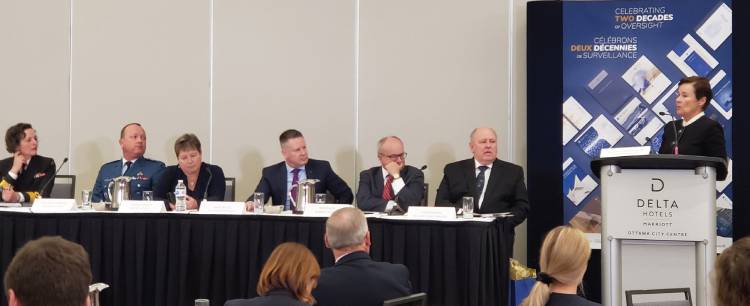
March 2000 First Interference Complaint Received
Interference Complaints: A Unique Concept
Post-Somalia NDA changes further enhanced Canada’s reputation as a leader in the area of civilian oversight of policing by being the first country to extend such oversight to its armed forces police services. These changes also created an entirely unique mechanism – the interference complaint – to support independence, fairness and transparency in Canadian military policing. Thus, Canadian Military Police – unlike their civilian counterparts – can complain to the MPCC about any attempts by the military chain of command or a senior official of the DND to improperly interfere in their investigations. Independence in the exercise of policing discretion was held by the Supreme Court of Canada to be an element of the rule of law.2
On March 10, 2000, the MPCC received a complaint about a commanding officer’s (CO) decision to proceed with the search and seizure of items related to illegal drugs in soldiers’ quarters, rather than wait for the recommended action of MPs obtaining a warrant and conducting the search. The complaint was resolved informally in a settlement conciliated by the Chairperson, whose report also made a number of observations on related issues.
2002 and 2014 Special Reports
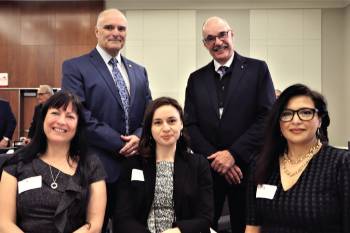
As “improper interference” with a police investigation is not legally defined, the MPCC sought to provide some guidance. A 2002 Special Report Interference with Military Police Investigations: What is it about? contrasted the unique interference complaint mechanism with the criminal offence of obstructing a peace officer. The report highlighted that the burden of proof required for an interference complaint of an ethical nature is less than that required for one of a criminal nature.
Twelve years later, the MPCC revisited the general question of improper interference. An August 2014 MPCC Special Report on Interference described the evolution of ‘improper interference’ over 14 years of complaint decisions. Notably, the report provided guidance as to the MPCC's understanding of how this concept interacted with the duties of MP supervisors. Starting in 2006, the MPCC began to receive interference complaints, unexpectedly, against MPs own supervisors. The MPCC immediately recognized the legitimate and essential role of such supervisors as a special case. They were responsible to guide frontline patrol MPs and investigators in discharging their duties and even in the exercise of their policing discretion. At the same time, supervisors had to act on a principled basis, not intervening in their subordinates’ cases for improper or illegitimate reasons.
June 2000 First Public Interest Investigation (PII)
Chairperson Cobetto called for this PII into complaints related to CFNIS investigations into allegations of attempted poisoning of a Warrant Officer by his subordinates while deployed in Croatia in 1993. There was controversy over the CFNIS's conclusions that criminal charges were not feasible. The NDA placed a three-year limitation period on such charges at that time. Due to the controversy generated by the CFNIS investigation, the CFPM referred it for review to the MPCC. The January 2001 Final Report of the MPCC found that the CFNIS did not mislead, intentionally or otherwise, the Chief of Defence Staff (CDS) or the Canadian public about the nature of the legal advice on which the CFNIS relied upon in reaching its decision not to proceed with charges.
March 2006 Peter Tinsley, second MPCC Chairperson, convenes first Public Interest Hearing (PIH)
The first PIH related to a complaint about a CFNIS investigation of an alleged sexual assault on a youth at a cadet camp. Another cadet was investigated for the crime, and the suspect’s mother fi led a complaint about her son’s treatment by the investigators. MPCC's December 2007 Final Report in MPCC 2005-024 PIH concluded the CFNIS investigation had been deficient in a number of areas, although there was no indication of prejudice towards the suspect.
October 2006 PII relating to MP investigation of CAF snipers deployed to Afghanistan
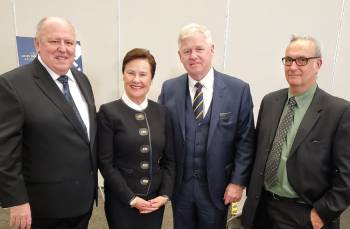
This complaint alleged unfair treatment by MPs of members of sniper detachments deployed to Afghanistan in the early days (March 2002) of NATO’s post-9/11 response. The snipers distinguished themselves in their mission, and were ultimately decorated by the United States and Canada. There were, however, concerns about some snipers’ conduct. Two were investigated by the CFNIS for the criminal charge of committing an indignity to the body of a deceased enemy fighter they encountered during operations. As well, one of these two was arrested by an MP for insubordination against a military Padre. No charges were pursued, but the complainants nonetheless felt they were being treated unprofessionally and harassed by the MPs.
After a thorough investigation, the MPCC issued its Final Report in December 2007, concluding the MPs had acted properly in response to the issues brought forward by the chain of command, but recognizing that operational stress no doubt affected the snipers’ perceptions. The MPCC recommended that the CFNIS make timely notification to subjects of investigations.
February 2007 Two public interest cases related to MP treatment of Afghan detainees
Attaran and Amnesty International Canada & BC Civil Liberties Association
Attaran (MPCC 2007‑003) related to possible MP mistreatment, or failure to investigate such, of detainees in Canadian Forces’ custody. Amnesty International Canada & BC Civil Liberties Association (MPCC 2007‑006) involved MPs’ transfers of detainees to the custody of Afghan security forces despite the risk of torture or other mistreatment. In March 2008, the second case was converted into the MPCC's second public interest hearing due to a lack of Government cooperation in producing relevant documents. The Government launched a judicial review of the MPCC's decision to take jurisdiction in the MP detainee transfer complaint.
Additional Complaints
Further complaints were fi led in June 2008, extending the timeframe of the detainee transfer complaint and alleging MPs' failure to investigate the CAF Task Force Commanders who ultimately decided to transfer detainees to Afghan security forces. In September 2008, the MPCC Chairperson merged the new detainee transfer complaints with the existing PIH. The Government launched an additional judicial review challenge to the MPCC's jurisdiction.
Final Report in Attaran PII
The MPCC April 2009 Final Report in the Attaran PII concluded that MPs were not responsible for the detainees’ injuries – likely sustained during their apprehension by Canadian soldiers in accordance with the applicable rules of engagement. The MPCC also determined that, while there was no attempt to cover up the injuries, the MPs did succumb to chain of command pressure to expedite the detainees’ handover to Afghan security forces, bypassing certain intelligence questioning and identification procedures. The MPCC recommended that the CFPM adopt a more complete command and control structure for MP members under the CFPM, and thus fully independent of the regular chain of command. This recommendation was accepted by the CFPM, and supported the CFPM's efforts to create the CF MP Gp which occurred in April 2011.
Federal Court ruling relating to MPCC jurisdiction
In September 2009, the Federal Court ruled on the judicial review applications regarding the MPCC's jurisdiction. It was ruled that the MPCC had jurisdiction to investigate MPs' alleged wrongful failure to investigate Task Force Commanders’ transfer decisions, but no jurisdiction to pursue complaints about MPs' handover of detainees to Afghan security forces. Government document production continued to be a problem for the Afghan detainee PIH, such that, in November 2009, MPCC Chairperson Peter Tinsley brought the issue before the House of Commons Special Committee on the Canadian Mission to Afghanistan. Subsequently, in 2010, document production improved, allowing the MPCC to complete its hearings.
2011 Federal Court Ruling
In September 2011, the Federal Court ruled on the Government’s judicial review applications to restrict the scope of the MPCC's inquiry in the Afghan Detainee PIH (2008-042). Justice De Montigny dismissed the Government’s application as premature, but still chose to address the Government’s substantive objections to the MPCC’s approach to the PIH. The Court stipulated that the MPCC, and not the Government, should determine relevance, and have some leeway in doing so. The Court even recognized that the MPCC's need to examine records which prove to be outside the scope of its inquiry, in order to satisfy itself that this is the case. In this regard, this decision has important implications for the MPCC and other independent oversight bodies on the issue of disclosure and who has the authority to determine relevance.
Final Report in the Afghan Detainee PIH
In June 2012, after the review of thousands of documents and testimony of 40 witnesses over 47 days of hearings during 2008‑2011, the MPCC issued its Final Report in the Afghan Detainee PIH. It found the complaint allegations to be unsubstantiated, and determined that MPs were not privy to the types of information which might have raised concerns regarding the post-transfer treatment of detainees. Thus, there was no basis for MPs to initiate an investigation into the transfer of detainees. The MPCC recommended improved information sharing between different rotations on external deployments, and within the command structure.
In light of the difficulties and delays encountered in obtaining the necessary disclosure of information in this case, and to enable the MPCC to fulfill its mandate more efficiently in future cases involving sensitive information, it was further recommended that the MPCC be added to the Schedule of designated entities under sections 38.01 and following of the Canada Evidence Act. This would allow the MPCC more expeditious access to relevant sensitive information for the purposes of investigating a complaint, while reserving the issue of public disclosure. This remains an ongoing issue.
May 2007 Brief to House of Commons Defence Committee on Bill C‑7
The MPCC objected to proposed changes in the Bill relating to the MP complaints process in Part IV of the NDA. The Bill purported to implement recommendations of former Chief Justice of Canada Antonio Lamer’s 2003 independent review of the 1998 amendments to the NDA. The MPCC objected to provisions which would have narrowed the Chairperson’s authority to call a PIH or PII, as well as MPCC access to certain information. The Bill did not proceed past First Reading.
February 2009 Final Report in PII into treatment of mental health detainee
This 2008 PII related to the treatment of a CAF member detained by MP and brought to hospital under the Mental Health Act of Ontario. This PII included a survey of the practices of various policing jurisdictions (in particular the use of handcuffs) regarding the treatment of mental health detainees. The MPCC's report resulted in a more nuanced approach to the use of handcuffs and other aspects of the treatment of a person arrested and detained for mental health assessment.
December 2009 MPCC celebrates its first decade
April 2011 A new streamlined MP command and control structure
As a result of the work of CFPM Captain(N) Steve Moore, and the MPCC's recommendation in the Attaran PII, the Canadian Forces placed all MP units under the command of the CFPM in a new formation, the CF MP Gp. MPs can, however, be detached from the command of the CFPM and placed under the command of operational commanders for specific military roles in support of military operations.
September 2011 Glenn Stannard, third MPCC Chairperson, convenes third PIH
In April 2011, the MPCC's third Chairperson, Glenn Stannard, launched a PII into complaints by the parents of Cpl Stuart Langridge, Shaun and Sheila Fynes, regarding CFNIS investigations of their son’s death. The major theme was that the investigations lacked independence and objectivity and were insufficiently thorough. This became a PIH in September 2011.
In March 2015, the MPCC issued its Final Report following an extensive process involving the analysis of over 22,000 pages of material and 62 days of hearings. The MPCC found a number of deficiencies in the CFNIS investigations, including an inexplicably long delay in notifying the Fynes of the existence of their son’s suicide note and giving them a copy. However, the MPCC found no evidence of CFNIS bias or a lack of independence in conducting the investigations. Improvements were recommended for supervision, policies and training in complex investigations; notably, that efforts be made to second CFNIS investigators to civilian police services in order to gain better ‘field’ experience in the conduct of sudden death investigations.
October 2011 Submissions to the Standing Committee on National Defence and Veterans Affairs regarding Bill C‑15
In 2011, the Government tabled legislation that proposed a new NDA section 18.5(3) to authorize the Vice Chief of the Defence Staff (VCDS) to direct the CFPM in the conduct of specific Military Police investigations. This provision was seen by the MPCC to threaten CFPM and other MPs’ investigative independence, contrary to reforms introduced to military policing post-Somalia. Chairperson Stannard appeared before both the House and Senate committees reviewing Bill C‑15 to oppose this amendment and recommended deleting the provision. The MPCC took no issue with the general supervisory role of the VCDS vis-à-vis the CFPM nor with the authority of the VCDS to issue general instructions. Bill C‑15 became law in June 2013 without the MPCC's suggested amendment.
November 2015 Hilary McCormack, fourth MPCC Chairperson, launches PII into Anonymous Complaint about MP abuse of Afghan Detainees
Chairperson Hilary McCormack launched this PII in response to an anonymous allegation of abuse during 2010‑11 MP training exercises. Allegedly, detainees were terrorized in holding cells by MPs practicing various aggressive techniques to deal with prisoner riots. The complainant expressed concern that no charges resulted from investigations by CFNIS and the chain of command. This was the first MPCC PII based on an anonymous complaint.
July 2016 Comprehensive timeliness review of complaints process
The MPCC is sensitive to, and shares concerns about, the length of the conduct complaint review process. This led to a comprehensive MPCC internal review of its process and the introduction of enhanced mechanisms to ensure the timely completion of investigations as well as new procedures to monitor progress.
April 2018 Chairperson Hilary McCormack calls PII relating to MP investigation of alleged torture of Battle School trainees
A complaint from former CAF member Mr. Jeffrey Beamish led to the latest PII, relating to his treatment, and that of other platoon members, during Infantry Battle School Training at Canadian Forces Base (CFB) Wainwright, Alberta, from October 1983 to March 1984. The complainant alleges his group of over 30 recruits were subjected to inhumane treatment, amounting to torture, during a prisoner of war scenario exercise. This experience led him to suffer from various conditions including major depression, post-traumatic stress disorder and night terrors. A CFNIS investigation had concluded without charges.

In Memoriam
PETER A. TINSLEY

On April 26, 2019 Peter Tinsley passed away, a few months short of his 70th birthday. An officer (Lieutenant-Colonel Retired), a lawyer and a dedicated volunteer to many causes, Peter was also the second Chairperson of the MPCC, serving from December 2005 to December 2009. Peter Tinsley brought a tremendous amount of experience to the MPCC with a 28 year career in the CAF, first as a military police member and then a lawyer with the office of the Judge Advocate General. Upon his retirement from the CAF, he was appointed Director of Ontario’s Special Investigations Unit, a position he held for 5 years. Following international work in Kosovo and Boznia as an international war crimes prosecutor, he was appointed as the Chairperson of the MPCC. Mr. Tinsley presided over the MPCC's first PIH and successfully opposed legislative changes which would have restricted the MPCC's mandate.
Mr. Tinsley prepared remarks for the 20th anniversary event in December, knowing he would not be present. Mr. Tinsley described the role of civilian oversight organizations as being a “bulwark” of democracy. He spoke of the “immensely important function of ‘shaping’ policing”, providing a defensive wall through civilian oversight to protecting safety and security and ensuring that the “trademark and function of the police…are universally consistent with the Rule of Law.”
Peter will be greatly missed, both personally and professionally. All of us in the MPCC family, both past and present, extend our heartfelt condolences to his wife Merry, his daughter Katie, his son-in-law and grandchildren.
Part 2 – The Year in Review
I – Monitoring and Investigations
The following table highlights the MPCC statistics on a four-year comparative basis from 2016 to 2019. The table cannot fully reflect the increase in the complexity and scope of the types of complaints the MPCC handles, nor accurately predict when complex complaints will be referred.
| Statistics from 2016 – 2019 | 2016 | 2017 | 2018 | 2019 |
|---|---|---|---|---|
| Conduct Complaints Carried Over | 41 | 36 | 53 | 37 |
| Interference Complaints Carried Over | 3 | 0 | 2 | 1 |
| Reviews Carried Over | 23 | 12 | 14 | 14 |
| s. 250.38 Public Interest Investigations/Hearings Carried Over | 1 | 1 | 1 | 2 |
| Judicial Proceedings Carried Over (e.g. Judicial Review) | 0 | 0 | 1 | 1 |
| Other External Proceedings Carried Over | 0 | 0 | 0 | 0 |
| Total Files Carried Over | 68 | 49 | 71 | 55 |
| General Files Opened (Request for Information and Other) | 60 | 44 | 64 | 51 |
| New Conduct ComplaintsNote (i) | 40 | 63 | 37 | 47 |
| New Interference Complaints | 0 | 2 | 0 | 4 |
| New Reviews | 2 | 12Note * | 9 | 9 |
| New s. 250.38 Public Interest Investigations/Hearings | 0 | 0 | 1 | 0 |
| New Judicial Proceedings (e.g. Judicial Review) | 1 | 1 | 0 | 0 |
| New Other External Proceedings | 1 | 2 | 0 | 0 |
| Total New Files Opened | 104 | 124Note * | 111 |
111 |
| Total Files under review in the Year | 172 | 173Note * | 182 |
166 |
| Public Interest Decisions/Rulings Issued | 0 | 1 | 1 | 2 |
| Time Extension Decisions Issued | 9 | 7 | 8 | 10 |
| Interim Reports Issued | 12 | 9 | 6 | 5 |
| Final Reports IssuedNote (ii) | 14 | 9 | 8 | 8 |
| Reports/Decisions/Rulings Issued | 35 | 26 | 23 | 25 |
| Recommendations on Final Reports | 19 |
11 | 5 | 5 |
| Percentage of Recommendations Accepted | 95% | 91% | 80% | 100% |
II – Public Interest Investigation into Anonymous Complaint (Treatment of Detainees)
On November 4, 2015, Chairperson Hilary McCormack decided that the MPCC would conduct a Public Interest Investigation (PII) into an anonymous complaint relating to the alleged mistreatment of detainees in Afghanistan by the Military Police. This is the MPCC’s 14th Public Interest Investigation, and the first to be launched based on allegations made in an anonymous complaint.
The complaint alleges that in December 2010 and January 2011, the Commanding Officer of the Military Police Company stationed at Kandahar Airfield, Afghanistan conducted exercises at the Detainee Transfer Facility in order to “terrorize” the detainees.
The complaint also alleges that the CFNIS failed to bring charges against the Military Police Commanding Officer following an investigation. The complainant alleges that no charges resulted from this and subsequent investigations by the Military Police chain of command.
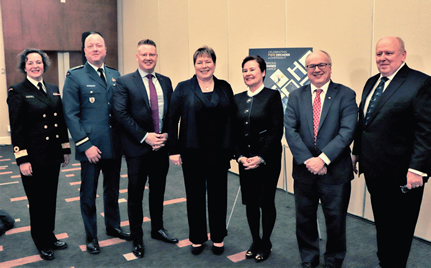
The decision to conduct a PII into this complaint took into account the nature and seriousness of the allegations, the need for an independent, public and transparent investigation process, and the measures taken by the complainant to protect his or her identity. In 2016, the Chairperson co-delegated this file to Commission Member Michel Séguin, and together they are conducting the investigation and will prepare the Interim and Final Reports.
Following considerable delays in the receipt of requested materials from the CFPM (in part attributable to a CFNIS decision to revisit the investigation), the MPCC received more than 3,000 pages of documentation in the summer and fall of 2016.
On February 27, 2017, the MPCC issued a decision regarding the scope of the PII and identified the subjects of the complaint. For reasons elaborated in earlier reports, the MPCC found that it did not have jurisdiction to investigate the aspects of the complaint relating to the conduct of the Military Police members involved in military operations, including the treatment of detainees, and that the administrative nature of an investigation by the Military Police’s chain of command, also fell outside its jurisdiction. Nonetheless, the conduct of the 2011 CFNIS investigation and the CFNIS’ decision not to lay charges following that investigation were found to be within the MPCC’s jurisdiction to investigate. As a result, it was decided that the PII would focus on the conduct of the CFNIS members involved in the 2011 investigation and decision not to lay charges.
The MPCC investigation proceeded with six subjects of the complaint. An investigation plan was prepared and the MPCC requested the assistance of the CFPM in order to access records held by the Canadian Joint Operations Command (CJOC) that could contain relevant documents for the PII.
Between July 2017 and September 2018, the MPCC investigators travelled throughout the country to meet and interview over 65 witnesses. The investigators then interviewed the six subjects of the complaint from October to December 2018. In 2018, the MPCC team also inspected hundreds of boxes of records held by CJOC. Documents relevant to the PII were identified, and copies were obtained.
In December 2018, the investigators began to review the evidence gathered during the PII and to prepare their Investigation Report. An additional witness interview was conducted in May 2019 to clarify information received during the investigation. The Investigation Report was submitted to the Commission Panel in July 2019.
After reviewing the Investigation Report, the Panel requested supplementary information. The information was compiled by the MPCC team and provided to the Panel in September and October 2019. The Panel members have now reviewed the information, and have begun to prepare the MPCC's Interim Report with their findings and recommendations with respect to the complaint.
III – Public Interest Investigation into a historical complaint alleging torture and abuse of former Canadian Armed Forces members during their training
On April 11, 2018, Chairperson Hilary McCormack decided that the MPCC would conduct a Public Interest Investigation (PII) into a historical complaint that alleges torture and abuse of former CAF members during their training. This is the MPCC’s 15th Public Interest Investigation.
In December 2016, the MPCC received a complaint from Mr. Jeffrey Beamish, a former CAF member. The complaint relates to a CFNIS investigation into alleged torture during training exercises that occurred at the Infantry Battle School at CFB Wainwright between October 1983 and March 1984. The complaint alleges, in essence, that a group of over 30 recruits were subjected to inhumane and emotionally damaging conditions during a Prisoner of War scenario.
The complaint also alleges that this exercise resulted in Mr. Beamish suffering from major depressive disorder, post-traumatic stress disorder, night terrors, paranoia and adjustment issues.
Mr. Beamish made a complaint with the CFNIS about these events. In August 2016, the CFNIS member in charge of conducting the investigation called Mr. Beamish to advise him that the investigation was closed. Mr. Beamish subsequently filed his complaint with the MPCC, alleging that the CFNIS investigator failed to investigate serious criminal matters and that this constituted professional negligence and incompetence.
The MPCC sent the complaint to the CF MP Gp Professional Standards (PS) Section for investigation, in accordance with the process set out in the NDA.
On September 20, 2017, the PS Section concluded its investigation, finding all allegations to be unsubstantiated. On September 26, 2017, Mr. Beamish submitted a request to the MPCC for a review of the complaint.
The MPCC received disclosure of the investigative files and related interview recordings in November 2017. Having reviewed these materials, the MPCC Chairperson decided to exercise her discretion to conduct a PII into this matter.
The Chairperson noted that an allegation that the CFNIS failed to investigate serious criminal allegations involving the military chain of command can impact on confidence in the Military Police and its independence, which in turn, heightens the need for an open and transparent investigation to be conducted by an independent agency.
The Chairperson further noted that this complaint raises systemic issues related to the respective roles and responsibilities of the police and prosecutors in making decisions regarding the pursuit of investigations and the laying of charges.
When the decision was made to conduct the PII in 2018, the MPCC identified two additional subjects of this complaint: the Warrant Officer who was in charge of supervising the investigation and the Officer Commanding the CFNIS Detachment at the time of the investigation.
In 2018, the MPCC investigators prepared a detailed Investigative Assessment and Plan. This document was reviewed by the Chairperson in September 2018, and the witness interviews began in November 2018. Since then, the MPCC investigators traveled throughout the country and have interviewed 23 witnesses so far. New witnesses were identified as the investigation progressed.
Beginning in October 2018 and throughout 2019, numerous requests for additional disclosure were transmitted to the CFPM, and the MPCC has been receiving and reviewing additional materials.
In April 2019, a CFNIS member involved in supervising the investigation was identified as an additional subject of the complaint as a result of the MPCC's review of additional materials obtained during the course of the PII.
In late 2018, the MPCC received additional documents from the complainant, who had obtained them further to an Access to Information request. As these documents contained materials that had not been included in the investigative files, the MPCC requested that a complete search of Military Police records be conducted in order to verify whether further additional relevant materials existed.
The MPCC also requested further information about Military Police policies and practices regarding the scanning of electronic correspondence in investigative files. These materials were provided to the MPCC in April 2019, and ongoing discussions took place with the CF MP Gp regarding the search of the MP records. In September 2019, a package of materials located as a result of a search of a portion of the records was provided to the MPCC. Discussions with the CF MP Gp continued in order to have searches conducted of other records relating to members who have retired or released from the CAF since the events.
IV – Impact on Military Policing – Case Summaries
The section below summarizes selected conduct cases completed by the MPCC in 2019.
Conduct Case Summary MPCC 2015‑045
Insufficient Investigation of Alleged Improprieties
A former Reserve officer and instructor at a Cadet Camp wrote to the JAG about alleged misconduct by staff members over a number of years and the unit’s response. The Commanding Officer (CO) of the CFNIS responded that these issues were raised previously in other CFNIS investigations, and no further action was warranted.
The complainant disputed this and filed a conduct complaint against the CO CFNIS with the MPCC. The MPCC first referred this to the Deputy Commander (DComd) Canadian Forces Military Police Group, who was unable to review the matter for seven months due to ongoing judicial proceedings. His decision letter agreed with the CO CFNIS that there was insufficient new information to warrant further investigation.
The dissatisfied complainant requested a review by the MPCC, which broke the complex complaint down into four allegations.
The first two related to the alleged conduct of the complainant’s CO in seeking, obtaining and disclosing information pertaining to the CFNIS investigation of a Cadet staff member who was then facing two charges of sexual assault before the courts.
The third allegation involved an incident reported by one of the alleged victims of sexual assault, who said she had been urged by another Cadet to drop her criminal complaint. This incident was reported to one of the CFNIS investigators, but not properly addressed.
The fourth allegation pertained to two historical incidents of sexual misconduct involving Cadet Camp staff. The complainant reported these to CFNIS but suspected proper action had not been taken. The first incident involved alleged obscene pictures of cadets with firearms. The CO had apparently given directions not to report this to the Military Police. The second incident related to a 20-year old alleged sexual act (off-base) between an instructing officer and an underage cadet.
The MPCC conducted an extensive review of the relevant material.
The MPCC found the first two allegations to be unsubstantiated. With respect to the complainant’s issues regarding his CO's efforts to obtain the information provided for the CFNIS investigation, they had been previously reported and addressed. The MPCC also concluded the disclosed information was neither confidential nor sensitive and that the CO CFNIS was correct that the matter did not warrant investigation. The MPCC found the second allegation to be unsubstantiated. It was determined that, as a member of the relevant chain of command, the complainant’s CO would have been entitled to access to the information in question.
The third allegation was substantiated. There was no evidence in the CFNIS investigation file of this incident having been reported to a CFNIS investigator, as the complainant claims he was advised by the sexual assault complainant. Moreover, the relevant CFNIS investigator did not recollect this when asked by the MPCC. Thus, an alleged sexual assault victim being told by one of her fellow Cadet instructing officers to drop her criminal complaint should have been new information for the CO CFNIS to address when responding to the complainant’s letter to the JAG. If true, this suggested a serious problem in that Cadet Instructor Unit. Because the information in allegation three was second-hand, there was a significant possibility of misunderstanding among the parties involved. Given that the identities of both parties to this alleged telephone conversation were known, it would have been easy to make some basic inquiries.
The MPCC found the fourth allegation to be substantiated, determining that CFNIS follow-up was inadequate.
Accordingly, the MPCC recommended further consideration of the matters raised by the complainant in allegations three and four. The MPCC also recommended that the CFPM direct MP members to ensure all emails related to an investigation are scanned into the relevant MP investigation file. This was found lacking in this case, and was a problem which further complicated an already challenging review by the MPCC.
The CFPM accepted the MPCC's findings and recommendations.
Conduct Case Summary MPCC 2016‑038
Serious Allegations against Unnamed Individuals
A former member of the military reported that she had been a victim of a number of assaults during her service. During a voluntary interview, the complainant provided several examples of alleged assaults and furnished documents intended to support her allegations. Given the serious nature of some allegations, responsibility for the investigation was assumed by the CFNIS.
Ultimately, having found no corroborating evidence and having sought further legal advice, the CFNIS investigators concluded their investigation and informed the complainant that the file was being closed unless additional information came to light. Dissatisfied with this, the complainant brought the matter to the MPCC.
The MPCC referred the complaint to the CFPM for an initial review and disposition. The Professional Standards (PS) office of the CFPM sought, but did not get, particulars from the complainant. Ultimately, PS wrote the complainant that in the absence of any specific allegations against any Military Police member, the review of her complaint did not identify any evidence of MP misconduct.
She then referred her complaint to the MPCC for review. The MPCC identified two subjects in the conduct complaint – the CFNIS investigators assigned to look into the alleged assaults. Three allegations were made against each investigator, concerning the lack of a thorough investigation into a number of alleged assaults.
Upon receipt of the complainant’s request for review, the MPCC requested disclosure of all relevant MP file materials from the CFPM. After an initial assessment, the investigators reviewed the materials received from the CFPM in detail to assess whether the MPCC needed to take additional investigative steps.
The MPCC determined that an investigation was necessary, including interviews of the complainant and the two subject members. At the conclusion of its investigation, the MPCC found that the subject members’ exercise of discretion to either not investigate certain allegations or not lay charges in others was reasonable. The evidence gathered by the CFNIS investigators was not sufficient to justify a criminal prosecution. The reasonableness of the decision not to pursue these allegations was bolstered by the fact that any prosecution would be very difficult given the length of time since the alleged assaults were reported to the police.
The MPCC made one recommendation regarding the need for training to emphasize the importance of noting the reasons why an investigation was or was not pursued.
The MPCC also made one observation. In this file, PS made several requests of the complainant to provide particulars of the complaint, claiming that there were no specific allegations made against any Military Police member. While there is no difficulty in asking for details when a complaint is considered vague, the MPCC observed that PS used the complainant’s failure to provide particulars as a reason not to deal with the complaint.
The CFPM accepted the MPCC’s findings as well as the recommendation.
Interference Case Summary MPCC 2017‑043
Alleged Interference of Evidence Tampering
The complainant Military Police member, alleged that a supervisor had interfered with one of his criminal investigations by deleting crime scene photographs from a camera’s memory card.
The MPCC conducted a detailed review of all relevant Military Police file materials received from the CFPM to assess whether to conduct additional investigative steps. The MPCC confirmed one subject of the interference complaint – the supervisor who was alleged to have deleted the crime scene photographs – and determined that further investigation was necessary, including interviews of the complainant, the subject, and one witness.
The MPCC found that the evidence gathered was insufficient to conclude who had deleted the crime scene photographs or when this had been done. The allegation that the complainant’s supervisor had interfered in his criminal investigation was therefore unsubstantiated. However, the MPCC's investigation revealed deficiencies in how photographic evidence was being stored as well as in the coaching provided to the complainant. As a result, the MPCC recommended closer monitoring of all officers’ adherence to the evidence procedures outlined in the MP Orders regarding the chain of custody for photographic evidence. Further, the MPCC made a recommendation enhancing the coaching provided by senior MPs to junior MPs.
Conduct Case Summary MPCC 2017‑015
Chain of Command had Legitimate Interest in Witness’s Information
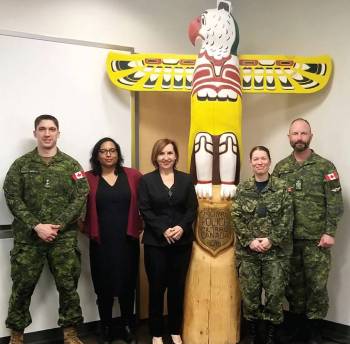
A Reserve Force officer in the Cadet program became a prosecution witness in a sexual assault case against a fellow instructing officer in the Cadet Camp. The alleged victim was a female officer in the Cadet Instructor Cadre (CIC). The complainant played a role in this alleged victim bringing forward her complaint to the CFNIS.
These events prompted an internal administrative investigation by the Cadet Camp chain of command (CoC). This process discovered other female CIC members allegedly subjected to the accused’s sexual misconduct. One agreed to report her story to the CFNIS, while the others preferred not to reopen the issue. As a result, the accused CIC officer was charged with a second sexual assault. The two cases were tried together and the officer was acquitted.
However, prior to and during the trial, various members of the complainant’s CoC sought information which he considered to be inappropriate. He believed that these efforts amounted to interference with – or intimidation of – a witness, and therefore, witness tampering.
The DComd, Canadian Forces Military Police Group, responsible for MP Professional Standards, reviewed the file, and dismissed the complaint without further investigation on the basis of paragraph 250.28(3)(a) of the National Defence Act (complaint deemed “frivolous, vexatious or made in bad faith”).
The complainant requested a review by the MPCC, which investigated two allegations. The first was that the subject CFNIS investigator was wrong to decline to pursue a CFNIS investigation into the complainant’s concerns about witness interference, etc., namely: (a) improper attempts by the complainant’s immediate CoC to communicate with him about problems at the Cadet camp; (b) intimidation by the JAG legal advisor; and, (c) unwanted contact by the national Cadet command and their inquiry officer’s naming of one of the sexual assault complainants. The second allegation was that the subject CFNIS investigator should have disclosed these alleged incidents of witness interference to the defence counsel of the accused CIC officer.
After thoroughly reviewing all documentation and the CFNIS file material disclosed to the MPCC, the MPCC found both allegations to be unsubstantiated. In concluding that the first allegation was unsubstantiated, the MPCC found it was reasonable for the subject CFNIS investigator not to reopen a criminal investigation in the sexual assault case. It was noted that the complainant had previously consulted with the relevant CFNIS investigator on the file and been advised that certain information could safely be shared with his CoC; and this information was identified. It was also reasonable for the CFNIS investigator not to open a criminal investigation regarding the JAG legal advisor’s statement. The MPCC found that there was nothing to suggest intimidation in the criminal sense (i.e., involving a threat of violence) or obstruction of justice.
Finally, the MPCC concluded it was reasonable for the subject CFNIS investigator not to investigate the other matters because: the complainant had left the CAF ; the evidence portion of the sexual assault trial was concluded; and the Criminal Code prohibition on revealing the names of sexual assault complainants applies to publication and not to private conversations.
In light of these findings, the second allegation was also unsubstantiated as the MPCC determined that there were no incidents of improper witness contact that would have required disclosure to the defence in the sexual assault prosecution.
In response to the MPCC's Report, the CFPM accepted the MPCC's findings.
V – Outreach
The MPCC’s outreach program is key to building relationships with the Military Police, the community they serve, the CAF at large as well as other key stakeholders. The value of meeting people face-to-face cannot be overstated. The MPCC greatly appreciates the efforts of the many individuals who organized, supported and participated in its outreach activities at the bases and the Canadian Forces Military Police Academy (CFMPA) as well as at other events.
Canadian Armed Forces Locations across Canada
These annual visits to military locations across Canada increase awareness of the MPCC's mandate and activities, build relationships with stakeholders and provide an opportunity to respond to questions and concerns about the complaints process. The primary audiences are:
- members of the Military Police who may be subjects, complainants or witnesses in conduct or interference complaints;
- the military chain of command, which relies on the services of members of the Military Police to maintain military discipline, but cannot interfere with police investigations; and
- those who may interact with the Military Police because they live, work, or visit a CAF base. The MPCC's connection to this group is often made through the executive directors and staff of the Military Family Resource Centre (MFRC) at each base.
The MPCC's goal is to reach as many members of the military family as possible, while respecting the operational realities of CAF bases and wings across the country and abroad.
In 2019, outreach activities focused on military bases in Ontario. MPCC staff visited CFB Kingston, CFB North Bay, the MP detachment of the National Defence Headquarters Carling and the CFNIS in Ottawa, CFB Petawawa and CFB Toronto.
The feedback provided by participants who attended the 2019 information sessions at bases and at the CFMPA remained positive and is used to continuously improve the content and style of presentations.
Military Police Academy
In addition to visits to CAF bases throughout Canada, the MPCC continued to have a significant presence at the CFMPA located in Borden, Ontario. This fall, the Chairperson and the Director General and Senior General Counsel of the MPCC visited the CFMPA and had the opportunity to tour the facility, observe training exercises and learn more about its history and heritage. As well, the Commandant of the MP Academy, Lieutenant-Colonel Battista, provided a very thorough briefing on the training curriculum. Throughout the year, the MPCC and Academy staff have continued to collaborate to ensure MPCC presentations are tailored to specific courses. The MPCC looks forward to continuing this interaction with the Military Police Academy.
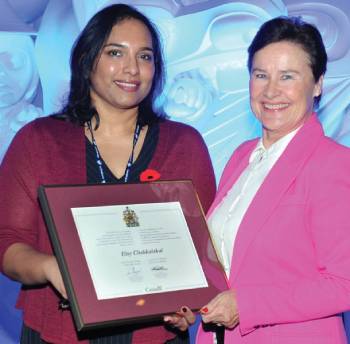
Canadian Association for Civilian Oversight of Law Enforcement
The Canadian Association for Civilian Oversight of Law Enforcement (CACOLE) is a national, non-profit organization of individuals and agencies dedicated to advancing the concept, principles and application of civilian oversight of law enforcement organizations across Canada and abroad. CACOLE is recognized worldwide for its policing oversight leadership. The MPCC's Chairperson is a Director and Secretary to CACOLE.
CACOLE's annual meeting was held this year in Toronto, Ontario from May 23 – 26 and was attended by the Chairperson and MPCC staff. This year’s theme was Civilian Oversight: Experience, Challenges & Opportunities. The Chairperson of the MPCC presented on the topics of de-escalation and stripsearches. A wide range of topics were discussed over the two days of the conference, including Post Traumatic Stress Disorder, Indigenous Perspectives, Cannabis and Bias Free Policing.
International Commission of Jurists Canada
The International Commission of Jurists Canada (ICJ Canada) is an independent, non-governmental, non-partisan organization, and a registered Canadian charity. Its membership is composed primarily of members of the legal profession: judges, lawyers, law professors, and law students from across Canada. The ICJ's mission promotes the cause of international human rights, the independence of the judiciary and the rule of law worldwide. MPCC's Senior General Counsel and Director General, Julianne Dunbar, is a member of the ICJ Canada’s Board of Directors. This past year, Ms. Dunbar was a co-organizer of the ICJ's military law conference titled Facing Changes in the Military While Respecting the Rule of Law: Emerging Responses and Legal Issues which took place on June 10, 2019. In addition, the Chairperson and several MPCC lawyers are members of ICJ Canada and attended the conference.
VI – Collaboration
Throughout the year, the MPCC continued to work towards resolution of a number of complex and challenging matters with the National Defence leadership, the CFPM, the military chain of command and the Military Police community. This work is undertaken with a view to making the complaints process more efficient and effective.
Canadian Forces Provost Marshal
The MPCC Chairperson and the CFPM continued the practice of having annual meetings to discuss matters of mutual interest, including their core mandates and objectives. On June 26, 2019, the MPCC Chairperson met with the CFPM along with their respective key staff to discuss issues with respect to the complaints process and to find ways to improve the process. These meetings have been fruitful in ensuring strong lines of communication and a collaborative relationship.
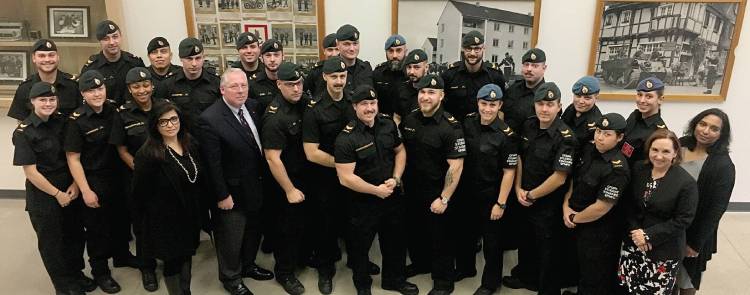
MPCC-CFPM Working Group
Established in 2015, the MPCC‑CFPM Working Group is an MPCC initiative to establish an ongoing forum to discuss and clarify issues regarding disclosure of Military Police information to the MPCC – specifically regarding what categories of information may properly be exempt from disclosure to the MPCC and how those categories are defined. The group is comprised of senior legal advisors from both organizations.
Part 3 – Stewardship Excellence
I – Financial Management
In 2019 the MPCC continued to demonstrate sound management of its financial resources. It effectively planned, managed and controlled its budget and expenditures to meet operational and central agency requirements including timely and accurate financial reporting. Throughout 2019, regular financial updates were provided internally to the MPCC Executive Committee and externally to central agencies in order to reinforce rigorous financial management and control.
Operating Budget: The MPCC’s ongoing annual budget of $4.3M supports the delivery of the MPCC’s legislative mandate under Part IV of the NDA. This includes complaints resolution and all other activities to support central agencies’ requirements, and reporting to central agencies and Parliament (Departmental Plans, Departmental Results Reports, Annual Reports, Financial Statements and Quarterly Financial Reports).
Additional Financial Information: Additional financial information about the MPCC’s financial and expenditure management may be found in the Publications Section of the MPCC’s website in the Departmental Plan, the Departmental Results Report, Quarterly Financial Reports, Annual Financial Statements and Proactive Disclosures.
II – Information Management and Information Technology

The MPCC is continuing to make progress in implementing information management best practices, and the transition to digital information management is on track. Some of the tasks we have accomplished this year include the completion of the digitization of files from Finance, Human Resources and Administration. It is anticipated that the project will be completed in the coming year. The migration of information to Documentum, our information management system, is also progressing well. This approach will improve information management, especially with regard to searching for information.
III – Mental Health and Wellness
An engagement day designed to provide an opportunity to employees to identify ways to improve their work environment was organized in May. The activity, which focused on the Beyond 2020 principles, resulted in the identification of three employee priorities and the creation of three internal committees to advance these priorities over the next year. Employees also led a wellness initiative by converting one of the meeting rooms into a Wellness Lounge to provide a more collaborative working space.
The MPCC also expanded its services offered to employees by formalizing an agreement with the Health Canada Employee Assistance Services to provide Informal Conflict Management Services including an Ombudsperson Service. The MPCC also includes a mental health and wellness section in its internal bulletins to share resources to employees and highlight key events such as the Bell Let’s Talk Day, Mental Health Week, the Mental Illness Awareness Week and the World Mental Health Day.

Finally, the MPCC's Mental Wellness Champion, the Senior General Counsel & Director General continued to educate employees about mental health and wellbeing by offering a session on Work-Life Balance and Resilience; sharing information and encouraging participation in events related to this topic. A selection of videos about mental health were presented at quarterly all-staff meetings as well as a presentation of the functionality of the LifeSpeak campaign, which provides mobile access at all times to a confidential, bilingual electronic learning platform for employees and their families.
IV – Inclusiveness
As part of its commitment to developing a diverse work environment, this year the MPCC continued to create an accessible work environment by addressing barriers and proactively addressing accommodation requirements to allow the full participation of its employees in the work environment.
The MPCC promoted many awareness days/months in a variety of fun and informal gatherings. These included Black History Month, Asian Heritage Month, Islamic History Month, Women’s History Month, Gender-based Analysis Plus (GBA+) Awareness Week and the Canadian Multiculturalism Day. The MPCC used the internal news bulletin as a tool to mark various other awareness days such as Zero Discrimination Day, the International Day for the Elimination of Racial Discrimination, Pink Day, National Indigenous Day, National AccessAbility Week and National Acadian Day.
V – Beyond 2020
In a desire to become a more agile, inclusive and equipped workplace of choice, the MPCC held an engagement session with all employees on May 23, 2019 designed to identify priorities for action following the MPCC 2017 and 2018 Public Service Employee Survey results. Three priorities for action were identified:
AGILE
Establish a Communication Task Force to establish what, when, why and how information is desired by all employees.
INCLUSIVE
Establish a Liaison Committee comprised of employees and management to improve the flow of information at all levels.
EQUIPPED
Establish a peer lead Buddy Program for new employees.
Part 4 – Chairperson's Conclusion
I began this report by emphasizing the need for cultural adaptation among police at all levels. Our third decade unfolds against an evolving backdrop. Society, governments and policing are all evolving – and oversight organizations must evolve to remain relevant and effective. The challenges are mostly known. We live in an electronic age where people communicate in ways our grandparents would never have understood. Technology has driven much of the change that affects modern society. But the technology available to police and government agencies is also accessible by criminals – the electronic wizardry that created smart phones and instant messaging also opened the door to increasingly complex cybercrimes as police forces attempt to keep pace.
Our December symposium to mark the MPCC's 20th anniversary generated a thoughtful discussion of how police must ready themselves for what the future holds. My sincere thanks go out to our former Chairperson, Glenn Stannard, for his skillful job in moderating the panel discussion. The panelists (RCMP Commissioner Brenda Lucki, Commodore Genevieve Bernatchez, Brigadier-General Simon Trudeau, Brigadier-General (retired) Robert Delaney, Professor Kent Roach and myself) shared views on the challenges of the future. Threats from cybercrime and bullying (including online bullying) are growing. Police services are responding with community outreach initiatives to ensure a better-informed public. Examples of victims’ bills of rights were noted, as was the concern about jurisdictional uncertainty when crimes occur in cyberspace.
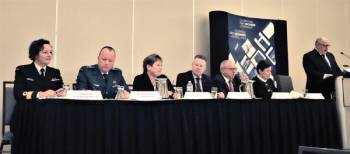
The reach and speed of communications through social media has increased the threat to public safety and security from home-grown and international terrorism. In many cases, such actions are attributable to known terror organizations, but we also face the possibility of “copycat” terrorist acts. The complexity of police investigations is also affected by the increasing prevalence of mental illness in the general population and even among police services. We must be ready to recognize symptoms and to step in as needed to protect people. This would include more awareness training and appropriate interventions in high-risk populations.
The symposium was a great success and generated food for thought as we map the path to our new decade and beyond. That path must include modernization and clarification of elements of the NDA to strengthen the MPCC's ability to deliver on its mandate. We have sought various improvements over the years. In the context of the upcoming review of the NDA, rules governing our access to information top the list
Access to information is the very raison d’être of an oversight body. If information relevant to the review of police conduct is not easily accessible to the MPCC, the MPCC loses a considerable amount of its credibility as an independent oversight body. While the MPCC has enjoyed good cooperation from the CFPM in recent years, situations of friction will inevitably arise. Cases with the potential to generate controversy or adverse public attention can test any such relationship. Yet, it is in just such situations where effective oversight is most needed in order to maintain public confidence in both the oversight body and, by extension, the overseen organization. In those critical situations, MPCC's oversight must not only be truly independent, credible and effective, it must be seen to be so. MPCC's authority and ability to access all relevant information (as the MPCC defines that relevance), must not be dependent on relationships between individuals in the MP and MPCC organizations.
Of the proposals we have made in the past, five are of the highest priority: (a) establishing the MPCC's right to receive any information which it considers relevant to its mandate; (b) the MPCC's access to solicitor-client privileged information where relevant and necessary for the determination of the complaint; (c) adding the MPCC to the Canada Evidence Act schedule of designated entities to receive sensitive defence, security and diplomatic information in appropriate cases; (d) the MPCC should have the power of Subpoena for all its processes to compel witness cooperation and the disclosure of information from all CAF/DND personnel; and (e) repeal of NDA restrictions on the MPCC receiving information from other proceedings. There is one new proposal – (f) that the MPCC be added to Schedule II of Investigative Bodies of the Privacy Regulations that we believe would assist the MPCC obtain more timely access to relevant documents. These changes would remove obstacles to the receipt of relevant information which arise, or could arise. In addition to enhancing the timely exercise of the MPCC's monitoring and public interest roles, with more robust authorities for and fewer impediments to accessing information, the MPCC would have a reduced need to call public interest hearings.
These proposals can be justified by comparable authorities available to the Civilian Review and Complaints Commission for the RCMP under Parts VI and VII of the Royal Canadian Mounted Police Act.

The third NDA review is scheduled for 2020 and the MPCC looks forward to bringing these issues to the table. With greater legislative clarity, and ongoing and future efforts to provide effective oversight of the military police in the evolving world of policing, the MPCC looks forward to continuing to provide excellent service to Canada’s military police, CAF and Canadians for the next two decades and beyond.
Hilary C. McCormack, LL.B.
Fellow Litigation Counsel of America
Chairperson
Our Organization
Biography of the Chairperson
Hilary C. McCormack, LL.B.
Chairperson
Hilary McCormack was appointed Chairperson of the Military Police Complaints Commission of Canada, effective October 5, 2015.
Prior to her appointment, Ms. McCormack was Director of Crown Operations (East Region) at the Ontario Ministry of the Attorney General, a position she had held since 2009. As Regional Crown Attorney, she supervised 10 Crown Attorney offices and was responsible for criminal prosecutions and summary conviction appeals in Eastern Ontario. In addition to her management duties, Ms. McCormack continued to prosecute many high profile and complex trials. She received the Ministry of the Attorney General Excelsior Deputy’s Award in 2010.
Ms. McCormack graduated from the University of Western Ontario’s law school. Following her call to the Ontario Bar in 1980, she was in private practice for three years before joining the Ontario Ministry of the Attorney General as Assistant Crown Attorney in 1983. She was seconded to the federal Department of Justice in 1992. Her work as General Counsel, Criminal Law and Policy, resulted in amendments to the Criminal Code which enhanced the general protection of women and children from sexual and physical violence for which she received the Department of Justice Deputy Minister’s Merit Award in 1994.
She returned to the Ontario Ministry of the Attorney General in 1994 where she continued to prosecute complex homicides and to develop her expertise in a number of criminal justice issues: child abuse, sexual assault and domestic violence; best practices in case management and trial processes and mental health. Over the course of her career, she travelled to Thailand and Kosovo to provide legislative and policy advice in these areas and frequently hosted many foreign delegations, including delegations from Russia, China, Afghanistan and the Palestinian Authority, on systemic issues and best practices.
Ms. McCormack prosecuted the first case in Canada to successfully use DNA evidence. She subsequently established an ad hoc committee to provide advice about the use of DNA evidence to Crown prosecution services and police services across Canada and internationally. She also worked on policy and legislative initiatives for both the DNA warrant provisions and the DNA data base which have transformed policing and prosecutions in Canada. This interest in facilitating transformative change also prompted her to implement a Drug Treatment Court, an Adult Mental Health Court and, for the first time in Canada, a Youth Mental Health Court while she was the Crown Attorney for Ottawa, an appointment she received in 2000, and the first woman to ever hold that position.
Between 2000 and 2005, Hilary McCormack was a member of the Department of National Defence’s Military Police Advisory Committee which provided advice to senior military leadership about significant changes to the military police and their investigative capacity. The committee’s recommendations improved the military police’s relationship with civilian courts and prosecution services, and provided opportunities for enhanced police training and education. In April 2016, she was formally inducted into the Litigation Counsel of America (LCA) at the LCA’s 2016 Spring Conference & Celebration of Fellows. She is a member of the International Commission of Jurists Canada.
Hilary McCormack has taught criminal law at the University of Ottawa, at the Bar Admission course, and served on the faculty of the Federation of Law Societies Criminal Law program. She is a frequent speaker at judicial, legal and police conferences, helped develop instructional material for the National Judicial Institute, and written and published extensively on various legal issues. She has served as a volunteer on the boards of directors and committees of not-for-profit organizations.
Biographies of the Commission Members
Michel Séguin (March 2014 – present)
Commission Member

Michel Séguin was appointed as a Commission Member March 6, 2014. He served as Interim Chairperson of the MPCC from March 28, 2015 to October 4, 2015.
Mr. Séguin has extensive operational policing experience, having spent 33 years with the Royal Canadian Mounted Police (RCMP). During his service with the RCMP, he held the position of Ethics and Integrity Advisor and adjudicated Code of Conduct hearings. Mr. Séguin retired from the RCMP in 2008 as Assistant Commissioner and the Commanding Officer of “O” Division (Ontario).
After his retirement from the RCMP, Mr. Séguin joined the House of Commons Administration as Director General, Parliamentary Accommodations Services, a post he held for five years.
Mr. Séguin was invested as an Officer of the Order of Merit of the Police Forces in May 2008 and a Serving Member of the Order of the Hospital of St John of Jerusalem in 2002. He is also the recipient of the Commemorative Medal for the 125th Anniversary of the Confederation of Canada, the Golden Jubilee Medal and the Royal Canadian Mounted Police Long Service Medal with Silver Clasp.
Mr. Séguin is an active member of the RCMP Veterans Association, the International Association of Chiefs of Police and is a Life Member of the Canadian Association of Chiefs of Police and the Ontario Association of Chiefs of Police.
Troy DeSouza (October 2015 – June 2019)
Commission Member

Troy DeSouza was appointed as a Commission Member from June 2015 to June 2019.
A long-time resident of Victoria, British Columbia, he has practiced law in B.‑C. for the past 21 years, providing legal advice to local government clients. He has conducted litigation before administrative tribunals, appeal boards, and at all levels of courts in British Columbia.
Mr. DeSouza is also an educator. He has created several courses for local government staff and elected officials. He is a member of numerous professional organizations, and was past Chair of the Municipal Law Section of the Canadian Bar Association, B.‑C. Branch.
Troy DeSouza is a graduate of the University of Windsor’s law school. He had a diverse career before being called to the Bar in 1998. He worked as a consultant for the Attorney General of Ontario, and served seven years in the Canadian Armed Forces where he obtained the rank of Captain.
Bonita Thornton (March 2018 – present)
Commission Member

Ms. Bonita Thornton was appointed as a Commission Member in March 2018. Ms. Thornton is a lawyer, manager and military veteran with extensive government and regulatory experience in administrative and criminal law. Previously she led Investigations Departments at the Law Society of Ontario and the College of Physiotherapists of Ontario.
Ms. Thornton worked for twelve years as a lawyer and officer with the Office of the Judge Advocate General, Canadian Armed Forces. From 2006 until 2012 she held the position of Assistant Judge Advocate General, Central Region, where she oversaw five legal offices across Ontario and provided advice and training to military commanders, police and personnel on a broad spectrum of legal and operational issues. She was deployed to Afghanistan in 2008‑2009 as the senior legal advisor to the Canadian Task Force in Kandahar.
Ms. Thornton grew up in Northern Ontario, graduated from Laurentian University and has worked across the country. She graduated from Queen’s Law School in 1997 and was called to the Ontario Bar in 1999. Ms. Thornton has received the Queen Elizabeth II Golden Jubilee Medal, Queen Elizabeth II Diamond Jubilee Medal and 125th Anniversary of the Confederation of Canada Medal for her contributions to Canada and her community.
Ron Kuban, Ph.D. (May 2018 – present)
Commission Member

Dr. Ron Kuban was appointed as a Commission Member in May 2018. A graduate of the Royal Military College in Kingston, Ontario, he completed his M.Ed. and Ph.D. at the University of Alberta. For the last 49 years, he has been employed in the public sector of Canada and Alberta, and in his consulting company regarding emergency/crisis management.
Dr. Kuban has held numerous senior positions of responsibility, both paid and voluntary. The former includes service as a Commissioned Officer in the CAF, a Commissioner on the Edmonton Police Commission, a Member of the Parole Board of Canada and currently as a Member of the Alberta Social Services Appeals Board.
Dr. Kuban volunteered for over 30 years on numerous Boards at local, provincial and national level, and was recognized for his service. Aside from his military medals, he was awarded the Queen’s Golden and Diamond Jubilee medals, as well as the Alberta Centennial Medal.
Organization chart
Alternate format
The image illustrates the Military Policy Complaints Commission of Canada's (MPCC) organizational structure, last updated in April 2018.
The highest position is the Chairperson.
The Senior General Counsel and Director General and the Commission Members report directly to the Chairperson.
The General Counsel and Senior Director of Operations and the Senior Director of Corporate Services report to the Senior General Counsel and Director General.
The General Counsel and Senior Director of Operations manages
- Legal
- Registry
- Investigations
- Information Management
The Senior Director of Corporate Services manages
- Human Resources
- Finance
- Administration
- Information Technology
How to Reach the Military Police Complaints Commission of Canada
Call our information line
613‑947‑5625 or toll-free at 1‑800‑632‑0566
Send us a fax
613‑947‑5713 or toll-free at 1‑877‑947‑5713
Send us a letter
Military Police Complaints Commission of Canada
270 Albert Street, 10th floor,
Ottawa, ON K1P 5G8
Visit us at the above address for a private consultation. An appointment is recommended.
Send us an email
Note: We cannot guarantee the security of electronic communications.
Visit our website
Follow us on Twitter
- Date modified:
